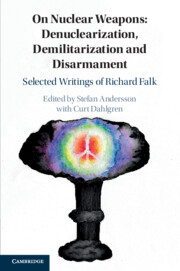 On Nuclear Weapons: Denuclearization, Demilitarization and Disarmament
On Nuclear Weapons: Denuclearization, Demilitarization and Disarmament Book contents
- On Nuclear Weapons: Essays by Richard Falk on Denuclearization, Demilitarization, and Disarmament
- On Nuclear Weapons: Essays by Richard Falk on Denuclearization, Demilitarization, and Disarmament
- Copyright page
- Dedication
- Epigraph
- Contents
- Foreword by Zia Mian
- Preface by Richard Falk
- Acknowledgments
- Part I International Law and World Order
- Contents
- 1 The Shimoda Case
- 2 Nuclear Policy and World Order
- 3 Toward a Legal Regime for Nuclear Weapons
- 4 Nuclear Weapons, International Law, and the World Court
- 5 The Nuclear Weapons Advisory Opinion and the New Jurisprudence of Global Civil Society
- 6 Inhibiting Reliance on Biological Weaponry
- Part II Impacts of Democracy, Neutrality, and National Interest
- Part III Nuclear Policy Initiatives
- Part IV Remembering the Past, Encountering the Future
- Index
4 - Nuclear Weapons, International Law, and the World Court
A Historic Encounter
from Part I - International Law and World Order
Published online by Cambridge University Press: 04 July 2019
- On Nuclear Weapons: Essays by Richard Falk on Denuclearization, Demilitarization, and Disarmament
- On Nuclear Weapons: Essays by Richard Falk on Denuclearization, Demilitarization, and Disarmament
- Copyright page
- Dedication
- Epigraph
- Contents
- Foreword by Zia Mian
- Preface by Richard Falk
- Acknowledgments
- Part I International Law and World Order
- Contents
- 1 The Shimoda Case
- 2 Nuclear Policy and World Order
- 3 Toward a Legal Regime for Nuclear Weapons
- 4 Nuclear Weapons, International Law, and the World Court
- 5 The Nuclear Weapons Advisory Opinion and the New Jurisprudence of Global Civil Society
- 6 Inhibiting Reliance on Biological Weaponry
- Part II Impacts of Democracy, Neutrality, and National Interest
- Part III Nuclear Policy Initiatives
- Part IV Remembering the Past, Encountering the Future
- Index
Summary
The International Court of Justice has issued an advisory opinion of great weight on the legality of nuclear weaponry. It is the first time ever that an international tribunal has directly addressed this gravest, unresolved threat to the future of humanity. The case divided the judges jurisprudentially and doctrinally in fundamental ways, with a narrow majority (which depended on a second casting vote by the President of the Court, Judge Mohammed Bedjaoui of Algeria) forging a consensus that lends strong, yet partial and somewhat ambiguous, support to the view that nuclear weapons are of dubious legality.
In an important sense the narrowness of the majority is misleading, as three of the six dissenting judges refused to support the decision because it failed to find that existing international law supported a categorical prohibition on the threat or use of nuclear weapons. In another sense, the absence of a clear majority reflects the Court’s failure fully to resolve the legal status of nuclear weapons. In fact, those judges that favored a stronger legal condemnation of nuclear weaponry appear to have regarded the majority decision as, if anything, a step backward, undermining the claims of scholars and others who had previously maintained that any threat or use of nuclear weaponry was illegal as such, without any consideration of context. What does seem definite, however, is that a fair reading of the decision represents a serious setback for the legal rationale relied upon by the nuclear states, and their academic supporters.
- Type
- Chapter
- Information
- On Nuclear Weapons: Denuclearization, Demilitarization and DisarmamentSelected Writings of Richard Falk, pp. 87 - 101Publisher: Cambridge University PressPrint publication year: 2019
